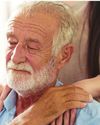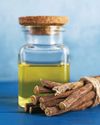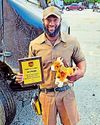CATEGORIES
最新のストーリー

PET THIEF LEGS IT WITH FERRET IN HIS PANTS
A SLIPPERY weasel played with a pet store ferret in Florida before shoving the critter down his shorts and strolling out the door, cops say.

ALZHEIMER'S JAB GETS CLOSER
SCIENTISTS may be closing in on a vaccine for Alzheimer's disease!

3 WAYS TO Banish Bloat FROM HEAD TO TOE
These spa-inspired tricks will help you look and feel summer gorgeous

Fruity delight
Sugar cookie mix does double duty as the crust and topping for these creamy squares

Katy Perry & Orlando Bloom's Relationship Has Been 'Breaking Down' for Months
More than six years after they got engaged on Valentine's Day, Katy Perry and Orlando Bloom aren't feeling the fireworks anymore.

DIMINISH DARK SPOTS
DERMATOLOGIST FIX

PARVATI SHALLOW All She Does Is Win
Once upon a time, Parvati Shallow was the reality star everyone loved to hate. After her first appearance on Survivor in 2006, she was slut-shamed for the way she played the game. “I was unapologetically using flirtation as a strategy, and that was not OK in the early 2000s,” she says.

GABBER TUCKER CHEWS THE FAT
PACKS ON 50 LBS as friends fret for his health

Grilled Shrimp With Garlic & Calabrian Chiles
'The recipe was inspired by summers in the Hamptons, but it's my way of proving that even the cleanest beach-house dish can—and should!—deliver a serious punch of flavor,' says the private chef and food content creator. 'These shrimp are my go-to whenever the menu needs a jolt of sunshine, smoke and heat'

TIGER TEES UP TRIAL MARRIAGE
Believes he'll stay the course with Trump Jr's ex-wife Vanessa

I'm Doing Everything I Can
AN ULTRARARE DISORDER, A FATHER'S FIGHT

Arnold Schwarzenegger
THE STAR, 77, RETURNS FOR SEASON 2 OF NETFLIX'S FUBAR

3 LITTLE GIRLS FOUND DEAD, DAD ON LAM
Kidnapped daughters bound & suffocated

BIANCA'S CREEPY COPYCAT ROUTINE WEARING THIN
COMPOSED Kim Kardashian has tolerated ex-hubby Kanye West's wife copying her look — but now the spooked reality queen is fed up with Bianca Censori's constant copycatting and fears the busty babe is becoming a creepy stalker, spies say.

JESSICA JABS NICK'S CRYBABY MEMORIES
Doesn't want least reminder of their time together

HEALTH, HAPPINESS & Keeping the Faith
with Grammy-winning musician, actress and entrepreneur QUEEN LATIFAH

SIMPLE WELLNESS SOLUTIONS
Acid-suppressing proton pump inhibitors (PPIs) can ease GERD symptoms, but the drugs come with side effects. Now, an Indian study suggests a safe alternative:

Nostalgic health boosters!
Pastimes you loved in the '60s, '70s and '80s are popular again. And it turns out enjoying them now improves your wellbeing.

Elio IN THEATERS
Pixar's boy-meets-aliens fantasy is extra-terrific

"I found an easy way to balance my blood sugar!"
Struggling with prediabetes and menopause, Amy Wilson felt hopeless—until she discovered macro tracking. By fueling her body right, she reversed her symptoms and lowered her A1C

"God put me in the right place at the right time!"
While driving his UPS delivery route one day, Raheem Cooper found a woman lying in her driveway, unable to move or speak. After getting her help, the pair became friends, and now he calls her Grandma!

AMY & T.J.'S PDA DAMAGE CONTROL
Busting at seams to convince all they're still a thing

DOMINATRIX HILARIA UNMANS HER MAN
Bosses Baldwin in hopes of profit FORMER leading man Alec Baldwin is now a bit player in his controlling wife Hilaria's endless over-the-top dramas, and friends of the onetime alpha male are shaking their heads in disbelief and urging him to show some self-respect, a source tells The National ENQUIRER.

How to Look Good (Almost) Naked
Game-changing products, rituals and no-nonsense advice that will help you look good in the buff, or a bikini!

Who Pays When a Husband Strays?
A family's declining fortunes on The Waterfront give Us an intriguing new TV couple to watch

DAKOTA HOOFS IT TO AVOID CHRIS' STINKY FEET!
DAKOTA JOHNSON is breathing a sigh of relief now she's finally cut the \"chord\" from reeking rocker Chris Martin-and one thing she definitely won't miss is his horrid hygiene habits, sources tell The National ENQUIRER.

DANNY & RHEA'S MODEL MARRIAGE ― IT'S BIZARRE!
Split over a decade ago but still sorta together

3 easy ways to block summer hot flashes
When shifting hormones and rising temperatures collide, the frequency of hot flashes can increase, as can symptoms like sweating, heat and flushing, found a study in Menopause. These simple fixes can help

SUTTON FOSTERS GRUDGE AGAINST HUGH'S EX DEB
Says she's not a homewrecker

EATING WITH JOY
A question, a recipe, a new pick from Joy Bauer, M.S., RDN, CDN, the trusted health and nutrition expert on NBC's TODAY show and #1 New York Times bestselling author
